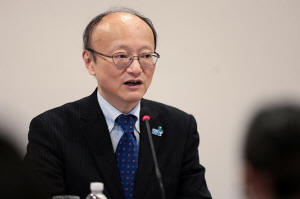Japan steps up yen warnings, data suggest intervention
 Send a link to a friend
Send a link to a friend
 [July 12, 2024] By
Makiko Yamazaki and Leika Kihara [July 12, 2024] By
Makiko Yamazaki and Leika Kihara
TOKYO (Reuters) -Japan's top currency diplomat said on Friday
authorities would take action as needed in the foreign exchange market,
resuming his jawboning after the yen's spike overnight raised market
speculation about currency intervention.
Bank of Japan (BOJ) data released later on Friday suggested Japan may
have spent up to 3.57 trillion yen ($22.4 billion) intervening in the
foreign exchange market to prop up the sagging currency.
Masato Kanda, who is vice finance minister for international affairs,
declined to comment on whether authorities had intervened in the
currency market to prop up the yen, but told reporters recent yen moves
were out of line with fundamentals.
Chief Cabinet Secretary Yoshimasa Hayashi also told reporters on Friday
that authorities were ready to take all possible action on exchange
rates.
The remarks on the yen break the recent silence among Japanese
officials, who have refrained from commenting on their readiness to
intervene as analysts question the effectiveness of jawboning in
stopping sharp yen declines.
"I've found recent big currency moves strange, from the perspective of
whether they were in line with fundamentals, and it would be highly
concerning if the excessive volatility, driven by speculation, pushes up
import prices and negatively affect people's lives," Kanda said.

"Currency interventions should certainty be rare in a floating rate
market, but we'll need to respond appropriately to excessive volatility
or disorderly moves," he added.
Finance Minister Shunichi Suzuki also told a regular news conference on
Friday that rapid, one-sided moves in the foreign exchange market were
undesirable.
The yen surged nearly 3% on Thursday in its biggest daily rise since
late 2022, shortly after U.S. consumer price figures revived market
expectations the Federal Reserve will cut interest rates in September.
GUESSING GAME
Some local media had attributed the yen's abrupt spike to a round of
official buying to prop up a currency that has languished at 38-year
lows. The dollar climbed back to 158.88 yen on Friday, after falling to
as low 157.40 yen on Thursday.
"Japan likely intervened as otherwise, the yen won't move that much so
suddenly," Takahide Kiuchi, an economist at Nomura Research Institute,
said of the yen's overnight jump.
[to top of second column] |

Japan's Vice Finance Minister for International Affairs Masato Kanda
speaks during a press conference after attending the G20 Finance
Ministers and Central Bank Governors meeting in Sao Paulo, Brazil,
February 29, 2024. REUTERS/Carla Carniel/File Photo

"Japan's past interventions were made when the yen was plunging,
some of which weren't necessarily effective. This time it worked
because authorities took action just when the weak-yen trend was
turning around," he said.
Meanwhile, the Nikkei newspaper reported that the BOJ conducted rate
checks with banks on the euro against the yen on Friday, citing
several sources.
Finance minister Suzuki declined to comment on whether authorities
made rate checks, which are seen by traders as a precursor to actual
yen-buying intervention.
Japanese authorities have recently made it standard practice to not
confirm whether they have intervened in the currency market or not.
Tokyo spent 9.8 trillion yen ($61 billion) intervening in the
foreign exchange market at the end of April and early May, official
data showed, after the Japanese currency hit a 34-year low of
160.245 per dollar on April 29.
Back then, authorities were suspected to have intervened in several
stages to create a buffer to defend the 160 mark against the dollar.
If Tokyo were to have stepped in on Thursday, it would have been
more aimed at accelerating the yen's rebound against the dollar that
occurred shortly after the weaker-than-expected U.S. inflation data.
Some analysts doubt whether intervention will work to reverse the
weak-yen tide.
"You can't change the market's trend with intervention. Whether the
market's phase would change depends largely on fundamentals," said
Tsuyoshi Ueno, an economist at NLI Research Institute.
(Reporting by Makiko Yamazaki, writing by Leika Kihara; additional
reporting by Mariko Katsumura and Yoshifumi Takemoto; Editing by
Sandra Maler, Sam Holmes and Christina Fincher)
[© 2024 Thomson Reuters. All rights
reserved.]
This material may not be published,
broadcast, rewritten or redistributed.
Thompson Reuters is solely responsible for this content.
 |